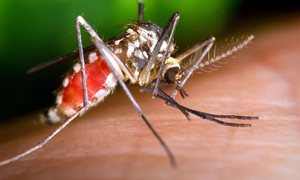
Elke Muntjewerff, theme Cancer development and immune defence, Laura de Vries, theme Infectious diseases and global health and Laurens van de Wiel, theme Nanomedicine, have received Rubicon funding from NWO/ZonMw. This will enable them to spend two years on research at a foreign institute.
Rubicon, part of the NWO Talent Programme is intended to give young, promising scientists the opportunity to gain international research experience.
The projects of the three researchers who received the Rubicon grant are:
Elke Muntjewerff - Disturbed cell communication in type 1 diabetes
Patients with type 1 diabetes are insulin dependent and need life-long treatment. In these patients, the communication between immune and nerve cells in the pancreas is disturbed. The goal of this research is to visualize the communication between these cells to help understand why people develop type 1 diabetes.
Laura de Vries - Mosquito-parasite interactions: an uninvited guest for dinner
Mosquitoes spread the devastating disease malaria by taking a bloodmeal from humans infected with the malaria parasite. The researcher will study how parasites use these mosquito resources for development, in order to find new ways to prevent malaria transmission.
Laurens van de Wiel - Finding diagnoses hidden in switches within the DNA
How can DNA changes lead to disease? This is often an unanswered question. New technologies that look beyond the scope of DNA may offer new insights. The researcher will develop novel bioinformatic techniques to combine these new information sources to find hidden switches in the DNA to better explain disease.
Start of career in top institute
Experience abroad is an important step in the career of many scientists. The Rubicon grant makes it possible for young researchers to do their research at a foreign institute that offers the best environment for their research. A total of 21 Rubicon researchers, including the three from the Radboudumc, will go abroad for 24 months. One laureate will go away for 12 months. The amount of funding depends on the chosen destination and the duration of the stay. Each year NWO/ZonMw can fund about 60 young researchers within Rubicon (for a total amount of 7 million euros, divided over 3 rounds.
read more
-
Want to know more about these subjects? Click on the buttons below for more news.
Related news items

Grants for research on magnesium deficiency and malaria Vidis for Felix Hol and Jeroen de Baaij
1 July 2022 Radboudumc researchers Jeroen de Baaij and Felix Hol both receive an NWO Vidi grant for their research, respectively on magnesium deficiency in type 2 diabetes and on malaria. go to page
Field research on malaria vaccine offers unexpected surprise
23 May 2022Field research on the effectiveness of a malaria vaccine, came up with unexpected results for an international group of researchers including Benjamin Mordmüller of Radboudumc. The vaccine evokes a broader response against malaria proteins than there are in the vaccine.
go to page
Neolithic made us taller and more intelligent, but more prone to heart disease How modern European populations have evolved over the past 50,000 years
6 April 2022 After the Neolithic, European populations showed an increase in height and intelligence, reduced skin pigmentation and increased risk of cardiovascular disease due to genetic changes that lowered concentrations of 'good' HDL cholesterol. go to page
Immunogenetic studies in diverse populations are essential Clear immunological differences between populations in Europe and Africa
15 February 2022 Genetic factors that partly determine host defenses sometimes differ significantly between people and populations. This is shown in a publication in the American Journal of Human Genetics by researchers from the Netherlands, Tanzania and India. go to page
NIH grant for follow-up research on tuberculous meningitis
10 February 2022Met subsidie van het Amerikaanse NIH gaat With a grant from the U.S. NIH, Reinout van Crevel will continue to unravel the disease process of tuberculous meningitis.
go to page
